- Home
- Jennifer Niven
Velva Jean Learns to Drive Page 6
Velva Jean Learns to Drive Read online
Page 6
Johnny Clay said, “You can keep him.”
Sweet Fern said, “Johnny Clay.”
He said, “I mean it. Let him stay overnight and sleep it off. It might do him some good. One of us might come for him tomorrow. Or we might not.”
Beach said, “I think Johnny Clay’s right. Leave him in there.” Beach was already on his way back to bed.
The rest of us looked at Johnny Clay. He said, “We’ll most likely see you tomorrow, Sheriff.”
The next day, sometime after lunch, Johnny Clay rode down to town with Linc in Linc’s old farm truck. It took them nearly two hours to get there and back over the old bumpy cattle road, but finally they came home with Daddy. When he got out of the truck, he didn’t say a word, just went into the woods and then came back later and got Linc and Beachard. They disappeared into the trees, and when they came out again, they were dragging the biggest boulder I’d ever seen, even bigger than the one Beachard had left in front of the porch on the day of Mama’s funeral. They pushed and pulled that boulder out of the trees, across the yard, and up the hill to the cemetery. Then Daddy walked back down, his face wet and red, and went into the house and came out with his tools. He went back up the hill and sat there for the rest of the day and the rest of the night, and when I got up the next morning, he was still there, carving that stone with his chisel and hammer.
Two days later, it was clear what he was carving—a cross. An enormous, raggedy, rugged old cross, just like the hymn.
With Linc’s help, Daddy moved the cross to the head of Mama’s grave, where they worked for nearly an hour to dig a hole deep enough for it in the dark soil. In the end, Daddy sank down on his knees and dug with his hands. When he had dug as deep as he could, he and Linc lifted the cross into the hole and packed the loose earth around the stone so that it finally sat there like a sad, mournful soldier.
Daddy stood there a long time, fingers bleeding, head bowed, tears streaming down his cheeks, and then he walked back down the hill—as slow as an old man—and went inside the house and got out his traveling sack, the one he used to carry all his things in, and dumped the contents onto the floor.
He saw me staring at the mandolin, the one he gave me years ago and that I gave right back to him. When I was eight, Daddy had ordered instruments from a mail-order catalog—just up and purchased an entire band from money earned on what he called a healthy vein of gold. Our whole family—for six generations back—was musical except for Sweet Fern, who couldn’t carry a tune in a bucket, but even she went down with us to Deal’s to pick up the instruments when they came in. Everyone from Sleepy Gap turned out to see, and for the first and only time in my life I was proud of something my daddy had done. But when I asked him where my instrument was, he said I was too young to have a new one, and that instead I could have his mandolin. He’d got himself a new guitar to replace it.
No one on the radio played mandolin—they all played guitar or banjo like my brothers. “I don’t want your old mandolin,” I told Daddy. “I want a new instrument like everyone else or I’d rather have nothing.” So he said fine, have nothing, and when it came to all of us playing music together, I was expected to sing or just bang on something like a drum.
Daddy handed me that mandolin now, and then he went through the house and picked up things that had belonged to Mama, books and a brush and her silver-plated mirror and some handkerchiefs, and he stuffed them into the sack and tied it tight. Granny had saved Mama’s wedding ring for him, and he put it on his pinky finger, right beside his own.
That night, when he was sitting on the front porch, staring off toward the mountains, his hands folded in his lap, I sat down next to him and said, “Tell me where you’ve been.”
He didn’t say anything, just sat there, so I said it again.
Granny passed by the door and said, “Come inside, Velva Jean. Let your daddy sit in peace.”
I said, “No, I will not. I want to know where he’s been.”
Daddy sighed. He said, “I’ve had an adventure,” but his voice was flat. He said, “I was in Weaverville. I walked from there to Virginia, across the top of the mountains, with a man who’s building a road. He’s building it right across the mountains, right across the tops of them. That road is going to reach from Virginia all the way down here, right down through these mountains we live in. It’s going to be the greatest scenic road in the world. A road of unlimited horizons.”
I listened until I couldn’t listen anymore. I stood up and said, “A road across the mountains? From Virginia to here? Does it take you to Africa or England too?”
Daddy stared at me.
Granny walked onto the porch. She said, “Velva Jean.”
I said, “Did you bring me something from the mountaintops? From the horizon?”
Daddy said, “I brought money. I worked hard to get it, to bring it back.” His voice caught, and he cleared his throat. He said, “There’s something for you in my bag.”
I said, “I don’t want it.”
And then I pushed past Granny and walked straight upstairs to my room and shut the door.
When we got up the next day, Daddy was gone and so was the sack of Mama’s things. But Daddy had left an envelope, fat with money, and he had left me something as well—an emerald, big and uncut. Johnny Clay whistled. He said, “You can’t get that kind of rock down here. Only place you can find emeralds is up there at Linville or Little Switzerland, up in the Black Mountains. What was Daddy doing up there?”
I didn’t say anything. I was turning the rock around and around in my hand so that it caught the light and made the green come alive.
Sweet Fern said, “A gem that size is probably worth some money.”
Ruby Poole said, “You ought to have Uncle Turk cut and polish it for you. He could turn it into a pretty ring or necklace.” Uncle Turk was Mama’s brother who lived down on the river banks like an Indian, cutting and polishing gems and camping along the river, living off the game he caught.
I looked at the rock as I turned it around, and I liked the feel of it—rough and raw, so sharp it could cut my hand. I thought I just might keep it that way.
I took the emerald upstairs and slid my hatbox out from under my bed. The hatbox was left over from Sweet Fern’s wedding hat and was where I kept all my treasures, little things I’d collected and that Mama and others had given me—a painted thimble, a silver whistle, my Little Orphan Annie secret decoder ring, some pretty stones, my fairy crosses, and clover jewelry me and Mama made. I had papered the insides with pictures of Buddy Rogers, the handsomest man I had ever seen, and Carole Lombard, swearing that I would one day be that glamorous. When I told Mama, she said of course I would, that I could do anything I put my mind to and not to forget it.
I opened the hatbox and set the emerald inside it, and then I closed it back up again. Then I went downstairs for breakfast. No one ate or talked, and when I walked outside afterward to give the leftovers to Hunter Firth, I saw Beachard’s stone—the one he had brought from the woods after Mama’s funeral. It sat, large and blank, still completely bare and empty—which was somehow worse than any message he could have written. Up on the hill, at the head of Mama’s grave, sat the enormous cross our daddy had carved. It was so heavy that it had started to lean a little, tilting forward over the earth as if it was bowing to Mama.
That night I lay in bed thinking about my daddy’s note—the one he’d left for Mama—until my face grew hot and my chest felt dull and heavy, like someone was sitting on it. When I finally fell asleep, I dreamed about my daddy and the little slip of paper he had left behind for Mama. He would hold it over my head, just out of reach, and wave it back and forth, laughing.
“Where you reckon that note is now?” I asked Johnny Clay, but he said it didn’t matter, that Mama was gone now and finding the note couldn’t bring her back. But I wanted to find it. I had to know what it said.
The next night, when everyone was sleeping, I got out of bed and went into Mama’s room think
ing I would go through her things till I found it. But when I walked in and shut the door behind me, I forgot why I was there because everything was just the way Mama had left it. Granny had made up the bed with fresh sheets and a coverlet, just the way Mama always did. It looked like Mama might walk in at any moment to fold back the covers and get into bed, like she’d just gotten up for a minute and would be right back. There was still a hollow in the pillow where her head had been.
I took Mama’s nightgown off the bedpost and held it up to me. It smelled like Mama, only the sickness smell was gone. It was just Mama now—a mix of lavender and honeysuckle and the lye soap with spices in it that Granny sometimes made. I sat on the very edge of the bed so that I wouldn’t disturb anything.
I spread Mama’s nightgown across my lap so it was covering my knees and my legs and hanging down to my feet like I was wearing it. I put my hand in the hollow of the pillow. I sat like that, watching the moonlight come in through the window, and thought how Mama was just here, and how just over a week ago I’d held her hand and talked to her and promised her I would live out there. And now, just like that, she was gone.
Toward morning, I hung her nightgown on the bedpost and went back to my own room, forgetting all about my daddy and his note. I climbed into bed and curled up in a ball and cried myself to sleep, and when I woke up I couldn’t remember dreaming at all.
The first thing I saw when I rolled over was Johnny Clay sitting up in his bed. I said, “What are you doing?”
He said, “Hush, Velva Jean.”
I could hear Sweet Fern and Danny talking downstairs. Johnny Clay had opened our door just a sliver and closed the window, even though we might suffocate from the heat, just so he could hear better.
“We can bring them home with us,” Danny said.
“No,” said Sweet Fern. “After all they’ve lost, those children will pitch a fit if we make them leave their home. Besides, there’s no room in the apartment.”
They were talking about Beachard and Johnny Clay and me. Linc was eighteen and already married to Ruby Poole and living on his own, but Beach was fourteen, Johnny Clay was twelve, and I was ten. I sat up in my bed.
Danny had promised Sweet Fern a beautiful house of her own, which he was going to build with the help of his brothers and his daddy. Sweet Fern had picked the house plan herself from a catalog and she was mighty proud of it. She got it out all the time to look at and show people.
“It don’t mean we have to give up the house,” Danny said now.
“I know.” We could hear her sigh even from downstairs. “I guess the thought of that house makes it easier to move back here for a while.” I imagined her looking up at the newspapers on the walls—the ones Mama had put up to cover over the cracks, the ones my brothers and I had learned to read from by studying the articles, advertisements, and cartoon strips—and at the old-fashioned kitchen, which was cramped and not at all fancy, not like the one Sweet Fern would have one day.
“We could ask Granny and Daddy Hoyt,” Danny said.
“No.”
“Or Zona.”
“No,” Sweet Fern said again. “Granny and Daddy Hoyt are too old to take on these children, and Zona’s not strong enough. Besides, Daddy asked me. He said I was the one to look after them. I’m to be their mother.”
I started to cough. I coughed so hard that my eyes began to water and I couldn’t get my breath. Johnny Clay jumped on me and put his pillow over my face to get me quiet, but I felt my whole world spinning away from me. Sweet Fern and I didn’t get on at all. She was barely even nice to me, and that was only because Mama used to be around to make her act civil. I couldn’t deny that Sweet Fern was born to be a mother, but I knew without a doubt that I didn’t want her to be mine.
For ten years, Sweet Fern had been the only girl—Mama and Daddy doted on her; Daddy Hoyt named her himself because she was his first grandbaby—and then I came along and she hated me right from the crib, no matter what Mama said about her loving me from the start. When Mama wasn’t around, Sweet Fern used to stand over me and just stare. Sometimes she would look mad and sometimes she would look sad, and one time she leaned down over me and said, “I wish you had never come.” Granny said there wasn’t any way I could know something like that, being just a baby at the time, and she said not to make up stories. But I remembered it.
And now she was going to be my mother.
“I’ll never leave you, Velva Jean,” Johnny Clay whispered. “Don’t you ever worry about that.”
“Promise?” For some reason, I felt more scared now than I’d ever felt in my life—more scared than I’d ever felt over Junior Loveday or the devil or the Wood Carver or even Mama dying.
“Promise.” We grabbed hands and shook, and then I lay back in bed and tried to conjure Mama’s face and her voice and her smell before the sickness. It was hard to think of her lying alone outside in the deep, dark earth, while we were inside where it was cozy. I lay there and pieced her back together as best I could—her bright smile; the way her eyes lit up when she sang; her long, curling hair, the color of winter leaves; the way her face was shaped like a heart, just like mine. I waited till she was fixed in my mind and then I shut my eyes. Just like that, her face was gone, but I could still feel the cold of the river water on my flesh and I could still hear her sweet, pure voice filling the holler down by Three Gum River, alive with the spirit of God.
Granny said Mama had answered the call of death’s angel. I wasn’t exactly sure what that meant, but I thought it sounded wonderful and grand and brave. It sounded just like my mama.
~ 1934 ~
No sweet and tender mother
Cheering their dark home,
No strong and loving father
Watching over them below.
—“Orphans”
SIX
It was the hardest winter anyone could remember. January filled the Alluvial Valley with snow until it was covered. The weather turned so cold and mean that we had to stay inside. There was sleet that cut your skin and fog so thick you couldn’t see two inches in front of you. We were closed off from the rest of the world and even from parts of our world—from Alluvial and from our own neighbors. We read and sang and slept and tried not to get on each other’s nerves. We crowded around the radio at Daddy Hoyt’s and listened to the news reports. That’s when we heard about the inspection party the government had sent out across the mountaintops to make a survey for the road they planned to build there. It was going to be a road from Virginia to North Carolina or Tennessee. The inspection party got as far as Grandfather Mountain but was forced to turn back because of the weather.
So it was true. There was going to be a road on the mountaintops, just like Daddy had said.
When the weather cleared and we were able to get down the mountain, we walked to Deal’s. Everyone was buzzing about the news. Linc bought a copy of the Asheville Citizen, a few days old. It talked about this scenic road that would open the mountains to tourists while saving the poor, downtrodden people who lived there: “These primitive mountain folk, these rural mountain poor deserve help. This scenic road will be the biggest thing that has ever happened or that can be expected to happen for them. It is essential if their economic needs are to be met. It is their only salvation.”
Everybody had something to say about this and none of it was good. No one liked being called “poor” or “primitive.” No one liked the idea that we were a people in need of saving. No one liked the idea of outlanders coming here and trying to change things. And most of all, nobody wanted that road coming in. Johnny Clay said if those road builders wanted to come to our mountains and cut a road through, they could just try. He’d like to see them do it.
I said, “I don’t want a road coming in here.”
Daddy Hoyt said, “We don’t know that it will, Velva Jean. But it’s a funny thing about a road. It’s not just an incoming road you know. It’s an outgoing road too.” ~
By May the sky had cleared and the sun
was out. I was sitting on top of the mountain, up on the highest point. I liked walking to the top of the mountain, to the bald spot, where I sat by myself and sang. I did this year-round, in the daytime when the panthers and haints were asleep, because it was up here that I could really hear myself. I was working on the words to a mean song. It was a song about a murder because lately I was in a murder sort of mind. I knew I had turned wicked since Mama died, that I was backsliding, but I didn’t care. All the songs I wrote now had murders in them.
I was staring off into the distance, toward the layers and layers of mountains, thinking that if I was a giant like Tsul ’Kalu I could step on them, from one to another, on their very tops, and walk across the earth. The air was clean and I breathed it in. For a moment, I almost felt like writing a pretty song. But then I saw, off toward Reinhart Knob, a line of automobiles and trucks. There were maybe twenty of them in all. They were stopped, men standing around. Some of the men were staring out into the valleys, hands on hips. Some of them stood with their eyes shielded from the sun, looking out toward me and my mountain.
I got to my feet and looked right back at them. I stared at them so hard I hurt my eyes, trying to look as fierce as I could. Maybe they would think I was a witch woman or a haint or a spirit from the mountain or an Indian princess. I thought I might scare them off and let them know we were a force to be reckoned with, not poor and primitive mountain folk who wanted them here. At the same time, I was trying to see their faces, trying to see if any one of them was my daddy. ~
On Memorial Day, we dressed up in our best clothes and climbed the hill to the cemetery. I carried merry-bells and Indian pink and the little white daisies that Mama loved, but not as much as she loved asters, which weren’t yet blooming. Sweet Fern and Aunt Zona had stayed up all night, making bright paper flowers. We sang hymns and, one by one, we remembered the dead. When it was time to talk about Mama, I didn’t have anything to say. Granny said, “Go on, honey.” But I just stood there, holding the flowers so tight that they turned my hand green.

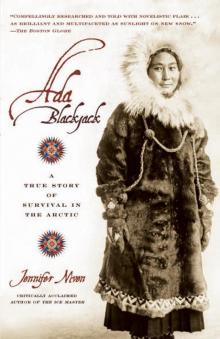 Ada Blackjack: A True Story of Survival in the Arctic
Ada Blackjack: A True Story of Survival in the Arctic The Aqua Net Diaries: Big Hair, Big Dreams, Small Town
The Aqua Net Diaries: Big Hair, Big Dreams, Small Town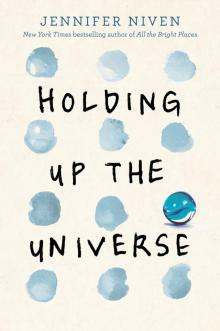 Holding Up the Universe
Holding Up the Universe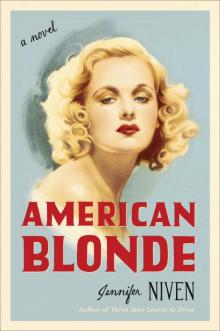 American Blonde
American Blonde All the Bright Places
All the Bright Places Velva Jean Learns to Fly
Velva Jean Learns to Fly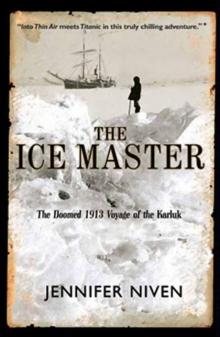 The Ice Master
The Ice Master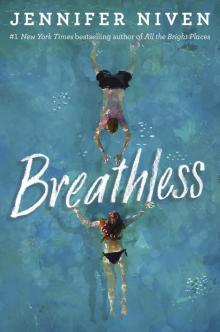 Breathless
Breathless The Aqua Net Diaries
The Aqua Net Diaries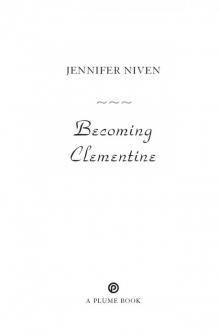 Becoming Clementine: A Novel
Becoming Clementine: A Novel